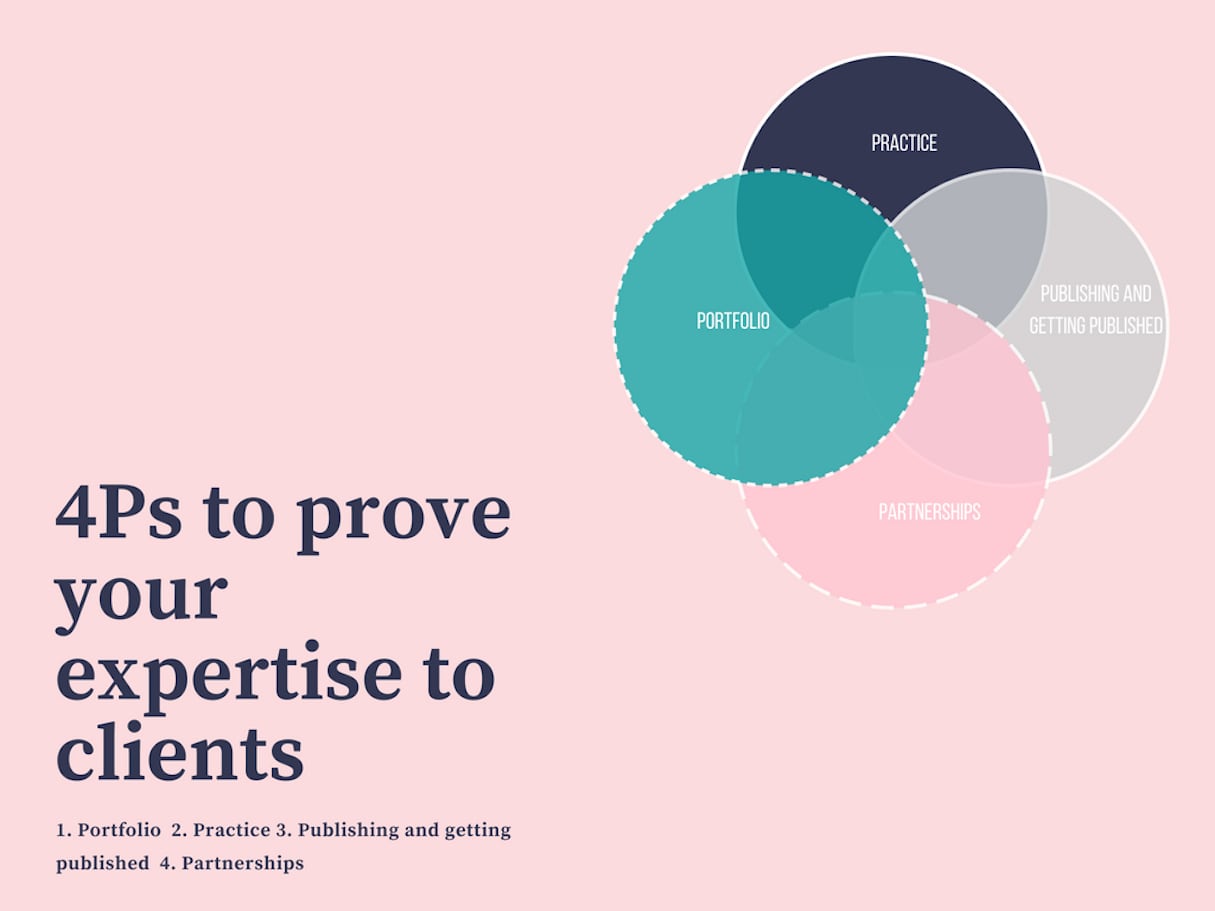You’re a driven professional with strong skills and capabilities. You're focused on your craft and committed to providing your clients with great service. You probably know that proving your expertise in your field is an important factor to attracting clients—according to the Referral Marketing Study by Hinge Research Institute, visible expertise is the most important factor in gaining trust and getting clients . Establishing yourself as an expert in your industry can have a huge impact on building that trust with clients.
. Establishing yourself as an expert in your industry can have a huge impact on building that trust with clients.
But proving yourself, especially in a crowded industry, can be tricky. Luckily, there are some important actions you can take to demonstrate your proficiency.
In this article, we’ll look at how the following four elements are key to positioning your expertise:
- Portfolio
- Practice
- Publishing and getting published
- Partnerships
By following this framework, you’ll not only build trust with your existing and future clients, but you’ll have the opportunity to elevate the quality of your work so you can continue building on your expertise . You can identify the gaps in your wheelhouse and work toward filling them, so you and your clients can be confident in your knowledge, with the proof to back it up.
. You can identify the gaps in your wheelhouse and work toward filling them, so you and your clients can be confident in your knowledge, with the proof to back it up.

1. Portfolio
The first step in demonstrating and communicating your expertise to the world is to create a portfolio. This is your hub, where you can get eyeballs on your professional highlights, skills, experience, awards, publications, and education.
Piling all this info onto a website is simple, and there are many platforms you can use, but getting it to stand out is what truly matters in proving your expertise and earning clients’ respect. Here are some factors to consider.
Quality
Quality is your number one concern when choosing your portfolio content and design. Select work you really care about that best demonstrates your talent, and shows off the kind of work that you’d like to continue doing. Instead of curating a portfolio of everything you’ve done, pick select things you’re confident in and love.
"You're judged by the worst piece of work in your portfolio, not your best,” says Verne Ho, Director of Design at Shopify. “Choose your pieces wisely and be critical and selective about what you include."
Simplicity
Displaying your work is the main goal of your portfolio, so make sure it’s designed in a simple yet compelling way. Putting care into the design of the portfolio is important, but what matters most is that you build a hierarchical journey for viewers. You want to take them from ‘Awesome’, to ‘WOW’, to ‘This is incredible!’ as they explore your work.
Make it special
Putting your personal mark on your portfolio is going to set it apart from portfolios that come off as dry textbooks of work. Below are some examples of real portfolios that demonstrate how to raise your voice with your work by embracing your personality.
- Creating an interactive experience
- Using an eye-catching color scheme
- Showing off your skills
- Using humor
- Writing case studies
- Choosing powerful imagery
- Designing an easy-to-scan layout
- Embracing video
- Showing off your personality
- Writing powerful intros
You might also like: Freelancing 101: How to Market a Small Business.
2. Practice

Even though the days of recess, detention, and school crushes may be gone, it doesn’t mean you can’t go back to school. If you want to be at the top of your game, you need to be continuously learning and evolving your skill set. Luckily, there are a lot of resources out there (many of them free!) to help you elevate the quality standards of your work and deliver consistently solid products and services to your clients.
Clients want to know that you’re at the forefront of emerging trends, and want you to be their go-to person for capitalizing on those trends. Here are a couple ways to make sure you keep up with your ever-changing industry.
Newsletters and blogs
Ever had that feeling where you’re walking a little taller because something you read in a blog or newsletter came up in conversation? These are great ways to digest helpful industry knowledge and news that you can apply to your work.
Below are some awesome newsletters you can subscribe to:
- Shopify Web Design and Development Blog (shameless plug)
- Morning Brew newsletter for business and world
- Seth Godin’s blog to learn more about marketing
- Sidebar for insights into the design world
- David Walsh Blog to dig deeper into development
- Funds for Writers blog to brush up on your writing skills
- TechCrunch for all things tech
Courses and exams
Ever since the digital revolution, learning online has continuously gotten easier. With plenty of sites offering online courses and tutorials, you can study anything under the sun, from horology (literally spending time learning about time), to writing, to web development courses. Institutes are constantly levelling the playing field to make education available to students around the world.
You can grow your knowledge by taking courses in anything you want, and have official proof of your expertise when you complete exams and testing. Including these results in your resume and portfolio will prove to your clients that you’re not only knowledgeable, but also dedicated to staying current on industry trends.
Courses and exams also let you set benchmarks within your team by using them to train members and establish best practices for your work. Below are some of the places where you can expand your knowledge and get official proof of your proficiencies.
You might also like: Starting Your Own Web Design Company: How to Freelance, Find Clients, and Grow Your Business.
3. Publish and get published
Getting published is a great way to establish thought leadership, get your name out there, and establish yourself as an expert in your field. People often think of blogs when they think of getting published, but that’s not your only option. There are lots of different ways to get your content out there for current and potential clients to notice. Below are some ideas.
- Be an active member in your community. Get involved in forums and groups and participate whenever possible. Ask and answer questions to show your involvement and demonstrate your expertise.
- Post thoughtfully on social media.
- Write blog posts, both on your own blog and as a guest author on third-party blogs.
- Create courses. You can use Udemy as a tool to publish your content so others can learn from your expertise.
- Develop for different marketplaces and app stores.
4. Partnerships

Partnering with others always opens the door to new perspectives on projects and skills. It acts as a basecamp for innovation and meaningful connections that help you build competency. When you partner with other industry experts, you grow your own reputation and renown, too.
The benefits of partnerships
Partnering with others in your industry opens to door to showing the community what you’re capable of. Here are some of the benefits of working with others.
- Making a profit: Partnering and collaborating gives you the luxury of added time, creativity, and resources on a project or product. When you have more creative resources, turning a profit on your product becomes easier to achieve.
- Constant learning: Partnerships open up the floor to different ideas, ways of thinking, and techniques that you may not have thought of before.
- Creative pursuits and innovative ideas: When you collaborate with someone else, you have the opportunity to bounce different ideas off each other. This combined effort often leads to a creative output that isn’t possible when you’re just one person. Using your differences in a positive way often leads to inspiring ideas and products.
- Consciousness: A component of partnerships and creative pursuit is getting to work on your skills of self-awareness. This will help you articulate your skills and ideas so you can be honest with yourself and others. This will set you up to better communicate with clients, and also gives you the opportunity to see where your expertise can be improved.
We’ve established that cultivating partnerships is imperative to establishing your expertise. The next step is finding opportunities for collaboration. The task might be daunting depending on your personality type, but there are always people out there open to partnering up on projects.
Try checking out community groups like Facebook, Slack, and LinkedIn. Visit forums where like-disciplined people hang out, and try collaborating on an app or design project. You can also seek out mentorship programs to boost yourself and others.
You might also like: The Statement of Work: How to Move Past Proposals and Win More Clients.
Get confident promoting your expertise
Proving your expertise in your industry is crucial to establish if you want to attract clients . As you continue dominating your craft, don’t forget the important final step of keeping your expertise updated. Taking the time to continuously learn will go a long way in keeping you in a position of leadership.
. As you continue dominating your craft, don’t forget the important final step of keeping your expertise updated. Taking the time to continuously learn will go a long way in keeping you in a position of leadership.
Learning to communicate that expertise wisely—by keeping your portfolio up-to-date, growing your knowledge constantly, being active in your community, and partnering with others—will keep you and your business at the forefront of your industry.
What do you do to prove your expertise? Share your thoughts in the comments below!








